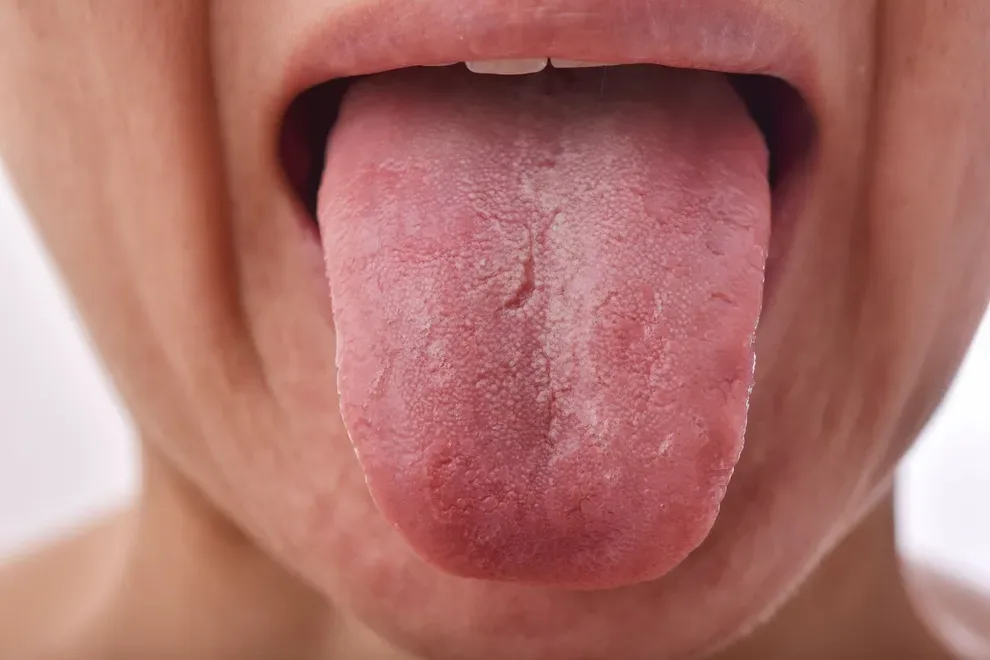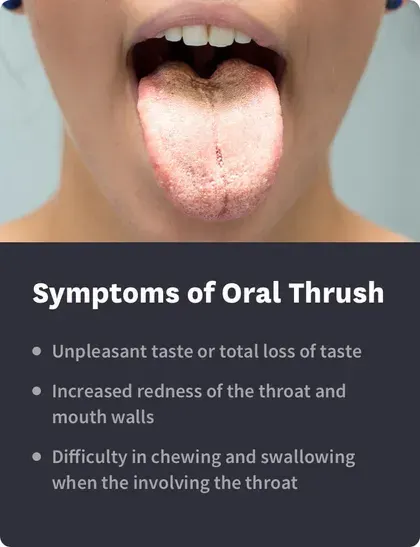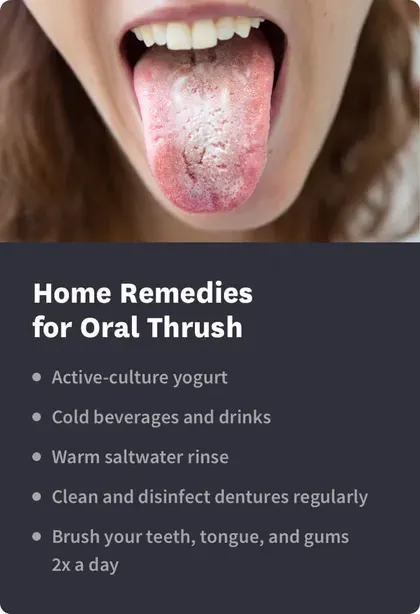How Long Does Oral Thrush Last Without Treatment?

Table of Contents
- What Is Oral Thrush?
- Treatment
- If Untreated
- Home Remedies
- When to See a Doctor
- References
A healthy individual has a relative number of microorganisms including fungi in their mouth. These organisms, known as normal flora, rarely cause disease. But in cases of reduced immunity, microbes may multiply and present with different symptoms. Oral thrush is one of the conditions that stems from fungal overgrowth in the oral cavity.
What Is Oral Thrush?

Medically referred to as oral candidiasis, oral thrush is an infection of the mouth caused by a group of fungi known as Candida. The hallmark of this type of candidiasis is white patches in the oral cavity.
Other symptoms of oral candidiasis include:
Unpleasant taste, especially after waking up or total loss of taste
Increased redness of the throat and the entire oral mucosa (mouth walls)
Cracking and pain at the corners of the mouth
Difficulty in chewing and swallowing when the infection involves the throat
You may experience all the mentioned symptoms of oral thrush or just a few of them. The manifestation of the infection varies from one individual to another depending on the immune status and personal oral hygiene.
Brushing can dislodge the mouth plaques and cause mild bleeding. Beyond that, oral thrush is not a serious infection.
How Do You Treat Oral Thrush?
Mild forms of thrush usually require no medical interventions. People with healthy immune systems clear the infection in a matter of days. You only need to maintain proper oral hygiene.

Severe cases of thrush will require medical help, and a typical antifungal treatment is largely effective. Topical and systemic medications are the dominant modes of treating serious infections. Prescription mouthwash can also provide considerable symptomatic relief.
Topical treatment of oral thrush involves the use of antifungal gels or suspensions that you apply directly to your mouth. You’ll often need to use these treatments several times a day or as prescribed by your physician.
You may need systemic medications, administered orally or intravenously, if your case is more serious and if you risk spreading thrush to other parts of the body. After evaluating your status, the doctor will decide which drugs best suit you.
While the antifungal drugs for managing oral thrush are relatively safe, you may experience limited side effects that include vomiting, nausea, diarrhea, or bloating. Sometimes oral thrush may be caused by prolonged use of particular prescription drugs such as corticosteroids. In such cases, drug withdrawal or dose reduction may be necessary for the management of thrush.
When diagnosing thrush, a visual exam is usually all that is needed; in addition to checking in your mouth, the doctor will ask you about your medical history.
What Happens if You Don’t Treat Oral Thrush?
For healthy people, oral thrush is rarely a problem. Cases are almost always mild, and they resolve themselves without any treatment.
Left untreated, however, candidiasis of the mouth can flare up into a serious systemic infection that involves several organs in immunocompromised subjects. The heart and lungs are the most likely organs to be affected.
Immunocompromised individuals have poor immunity with decreased ability to fight diseases. The majority suffer from other co-morbidities such as HIV, diabetes or cancer.
Home Remedies for Thrush
Unless you have a serious infection, simple home remedies are enough for symptomatic relief and elimination of oral thrush. Active-culture yogurt, for instance, acts as a biological way of clearing the yeast from the mouth. The yogurt is rich in probiotic bacteria, Lactobacilli, which compete with the yeast cells for nutrients leading to a decreased growth of the fungi. The use of active-culture yogurt in some age groups including the pediatric category requires the input of a qualified health professional.
If you experience itching or burning sensations associated with oral thrush, cold beverages and drinks will give you temporary relief. Smoothies, crushed-ice beverages and chilled soups are among the easy-to-swallow remedies you can try.
Warm saltwater is another non-medical way of dealing with thrush. Dissolve a half teaspoonful of salt in a cup of warm water and gargle to relieve throat soreness.
Maintaining good oral hygiene is the ultimate home remedy for thrush. Brushing your teeth, tongue, and gums at least twice daily using a soft toothbrush helps to keep your mouth clean. After every meal, rinse your mouth with water to wash away food particles that would otherwise promote the growth of Candida.
If you use dentures, keep them clean by disinfecting them regularly. You will want to avoid alcohol-containing mouthwashes that are likely to worsen the burning sensation of thrush.
When Should You See a Doctor?
Oral thrush is often a mild infection that usually doesn’t require a trip to the doctor or urgent care. However, you should seek medical advice as soon as you develop signs and symptoms of the condition. The doctor will examine your mouth to diagnose the infection but may also perform blood tests to check for other medical conditions often associated with oral thrush.
Oral thrush is a rare infection in the general healthy population but occurs in up to a third of patients with advanced AIDS disease.
